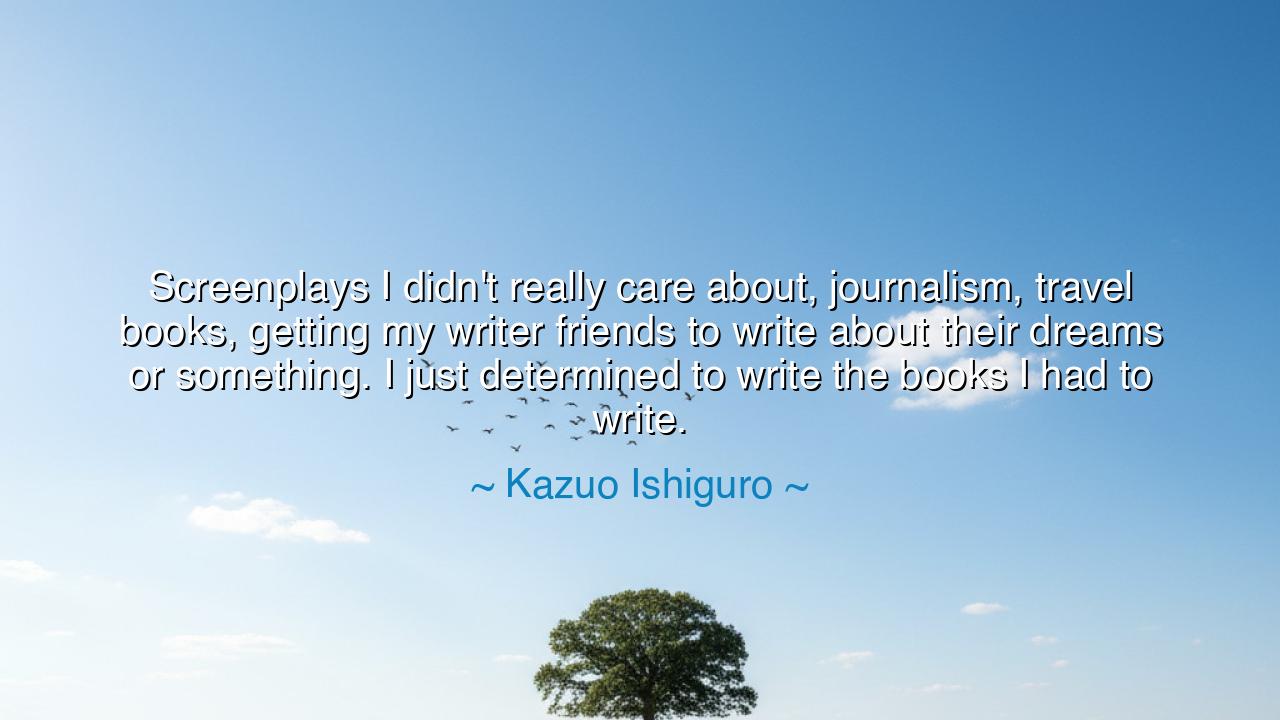
Screenplays I didn't really care about, journalism, travel books
Screenplays I didn't really care about, journalism, travel books, getting my writer friends to write about their dreams or something. I just determined to write the books I had to write.






The words of Kazuo Ishiguro resound like the quiet declaration of a monk who has finally found his true temple. “Screenplays I didn’t really care about, journalism, travel books, getting my writer friends to write about their dreams or something. I just determined to write the books I had to write.” In this confession lies the essence of purpose—that sacred fire which burns beyond ambition, beyond vanity, beyond the endless distractions of lesser pursuits. It is a vow not to the marketplace of men, but to the voice of the soul itself. Ishiguro, in his stillness and simplicity, speaks a truth that has echoed through every age: that to live meaningfully, one must listen for the work the heart commands—and follow it without fear.
In his youth, Ishiguro wandered the uncertain lands of creative endeavor. He wrote screenplays and journalism, chased ideas that glittered with opportunity but lacked the pulse of necessity. Like many seekers before him, he mistook activity for purpose, motion for meaning. But the day came when he felt the pull of a deeper calling—a voice within that whispered not, “Write something,” but “Write the books you were born to write.” It was not a decision made in ambition, but in surrender. For true calling is not chosen; it is accepted. And from that acceptance came the novels that changed the shape of modern literature—works like The Remains of the Day and Never Let Me Go, born not from the world’s demand, but from the soul’s insistence.
The ancients, too, knew this truth. They told the story of Odysseus, who, though offered immortality by the goddess Calypso, longed instead to return to his own land—to the fate that was his alone. Many paths were open to him, but only one was necessary. And so it is with every artist, every thinker, every human being. The world will tempt you with ten thousand roads: wealth, applause, imitation, comfort. But only one road leads home—the road of authentic purpose, the labor that no one else can do for you. To walk that road is both burden and liberation, for it asks everything and gives meaning in return.
When Ishiguro speaks of rejecting the trivial, he speaks for every person who has felt the quiet ache of knowing they are meant for something more. The screenplays, the travel books, the clever projects that please the intellect but not the heart—these are the echoes of other people’s dreams. They are the distractions of a restless mind that fears silence. But when one dares to stop, to listen, to ask “What must I truly create?”—then something miraculous occurs: the voice within grows louder than the noise without. The writer finds his words; the craftsman finds his art; the wanderer finds his path.
Consider the life of Vincent van Gogh, who lived in poverty, rejected by the art world, but remained steadfast in his vision. He painted not for fame or favor, but because he had to. His art was his confession, his necessity, his survival. He once said, “I am seeking. I am striving. I am in it with all my heart.” And though he died with little, his work endures like sunlight through the centuries. His life, like Ishiguro’s words, reminds us that greatness is not born of opportunity—it is born of devotion.
The lesson is clear and timeless: do the work that your soul requires, not the work that the world rewards. The world will always offer distractions disguised as duties. It will tell you to chase profit, or to imitate what is popular, or to satisfy the expectations of others. But if you betray your calling, you will spend your years building monuments to other people’s dreams. To be truly alive is to listen inwardly—to find that one sacred task, that “book you must write,” whatever form it takes, and to give yourself to it completely.
So, my listener, take this teaching to heart: determine to create what you must, not what you can. Let your effort be guided by conviction, not convenience. Seek the stillness where the whisper of your true purpose can be heard. When you find it, hold it as one holds a flame in the wind—protect it, nurture it, feed it with your life. For that flame, and that flame alone, will light the path through darkness and lead you to the truth of who you are.
And when the world calls you back with promises of ease or praise, remember the wisdom of Ishiguro: “I just determined to write the books I had to write.” There is no higher commandment for the soul than this—to honor the necessity of one’s own creation, and in doing so, to leave behind a work that will echo long after the voice that birthed it is gone.






AAdministratorAdministrator
Welcome, honored guests. Please leave a comment, we will respond soon